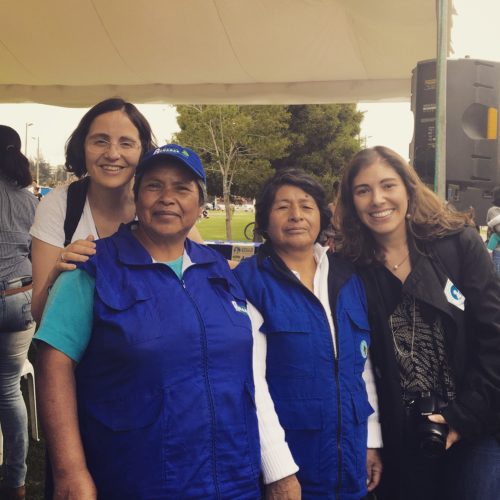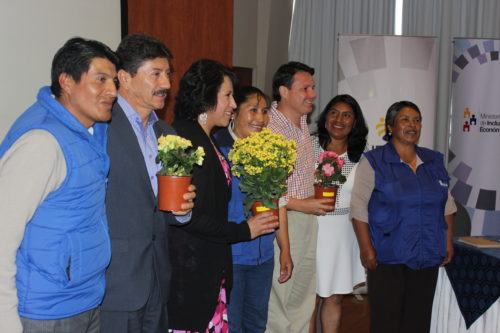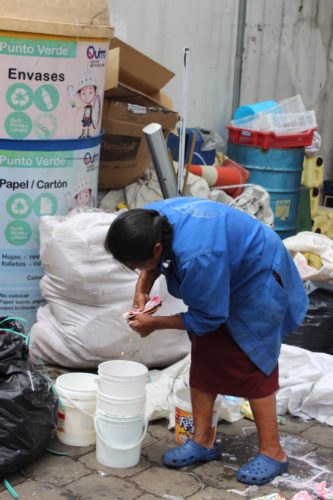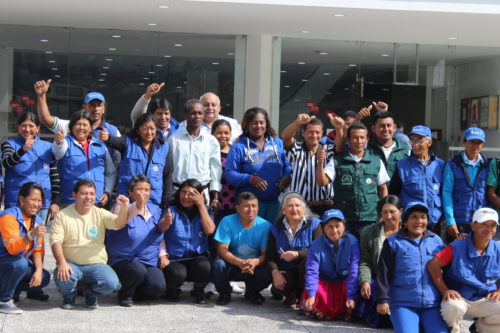Posted by International Alliance of Waste Pickers
Written by Olga Abizaid, Ana Carolina Ogando
Region Latin America
Country Ecuador
June 17, 2016
In March 2016, AVINA and Red Nacional de Recicladores de Ecuador (RENAREC) invited WIEGO to visit Quito, Ecuador in order to get a better understanding of the waste sector dynamics in the country. Ana Carolina Ogando and Olga Abizaid represented WIEGO in a series of events marking International Waste Pickers Day, including a session at the Legislative Assembly celebrating International Women’s Day, a public meeting to renew the inter-ministerial agreement with RENAREC and RENAREC’s National Assembly.
The objective of their visit was to get a better understanding of the challenges waste pickers face in terms of local and national dynamics, as well as the advances they have made. More specifically, they were interested in conducting interviews with women and men waste pickers from diͿerent regions in Ecuador to learn about the organizing process in RENAREC, the policies that are needed to strengthen inclusive recycling and any specific difficulties women waste pickers face in the recycling context. WIEGO also had the opportunity to share some of the work it has done in terms of supporting informal workers, including waste pickers, and in conducting workshops on gender equality in Brazil (for more on the Gender and Waste project in Brazil, see here).
“We face dangers every day because of infections, because we are
dealing with waste daily, so we are at risk of getting some disease…”
During the visit, Ana and Olga spoke to many waste pickers. As part of the documentation process, they interviewed 10 waste pickers and visited an association. The waste pickers discussed the different work environments and conditions, being that some work on the streets, in open-air dumps, in landfills and even in collection centers. The relationship with the local government plays a direct role in improving waste pickers working conditions. Some of the workers’ main concerns include being exposed to health and safety risks due to the lack of protective equipment, precarious working conditions and the need for access to health services and/or information on health issues. Women waste pickers also highlighted how access to municipal public child care services was very useful in helping them balance work and family responsibilities.
Workers also emphasized the importance of RENAREC in helping them make political demands and in maintaining a dialogue with government ministries. Through RENAREC’s work, waste pickers now feel proud of the services they carry out and understand the importance of consolidating their movement to seek recognition from society and government. While waste pickers claimed they have felt less stigma and discrimination, they are still not fully recognized as environmental or economic agents.
In the interviews and conversations with women waste pickers, the majority said they are interested in capacity-building workshops that focus on leadership skills, conflict management within their organizations and women’s health issues. They also discussed some of the problems they have in their workplace and in their homes. Many women expressed great respect for the women leaders in RENAREC, who often serve as role models for other women who would like to strengthen their leadership skills.
“For me recycling is a respectable job like any other job and I’m proud to be a recycler. It hasn’t been dificult for me [to be a leader] because I have had the support from my husband, from my children to continue my work with recycling.”
“We are very proud of being women. Think about it: women wash, women cook, women are wives, women work: women do everything!
And we do all of this every single day of the year. We are women; we do everything that is related to being a woman. For instance, we work, we educate our children, we do the housework, we are wives, we do
everything, we are leaders!”
It also became clear that being a strong woman leader depends on receiving support from families and husbands.
The trip to Quito was a very important learning experience for WIEGO. These impressions are useful for thinking about future discussions, such as
- The relevance of waste pickers for cities and the environment.
- Greater access to policies that protect and recognize waste pickers.
- Understanding the links between gender equality and rights to the city.
We are thankful for the invitation from RENAREC and AVINA. And we are especially grateful to the women and men waste pickers from RENAREC for their time and willingness to share their stories and experiences with us.
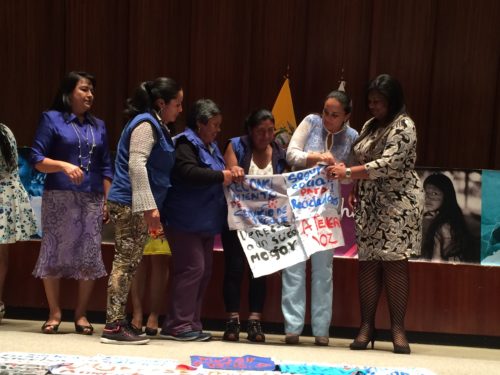
On International Women’s Day women Leaders from Renarec present their concerns at the National Assembly Photo by: O.Abizaid
It is possible to download this report in pdf format:
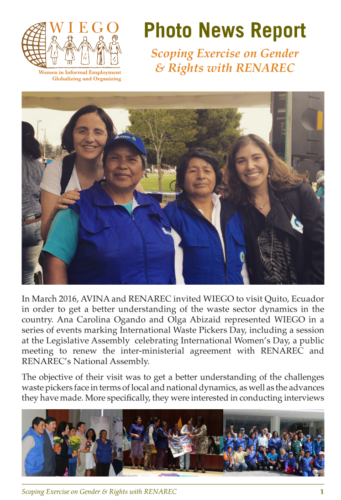
Download Photo news report (pdf). Scoping exercise on gender and rights with RENAREC
Tweet


